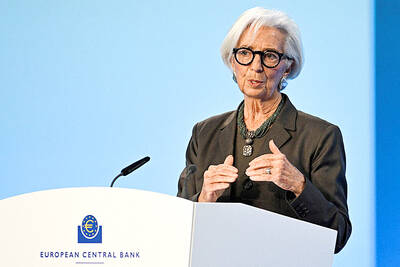British energy giant Shell PLC yesterday said its net profit soared 26 percent in the first quarter of the year as soaring oil prices offset a sizeable charge linked to its Russia exit.
Profit after tax leapt to US$7.1 billion compared with a year earlier, Shell said in a statement.
While the group took a US$3.9 billion charge on its exit from Russia after Moscow invaded Ukraine, it saw lower costs elsewhere.

Photo: AFP
Underlying earnings spiked almost threefold to a quarterly record of US$9.1 billion, sparking fresh calls in the UK for a windfall tax on energy majors.
British consumers are enduring a cost-of-living crisis caused by the highest rate of inflation in decades, also as economies reopen from COVID-19 pandemic lockdowns.
British Prime Minister Boris Johnson, who was yesterday facing a key midterm test in local elections, has dismissed calls for a windfall levy on oil giants, arguing it would slow their efforts to invest in cleaner energy.
Shell added that its revenue rallied 51 percent to US$84.2 billion in the first three months of the year.
Oil prices have surged in the past few months on concerns over tight supplies following the invasion of Ukraine by major oil and gas producer Russia.
“The war in Ukraine is first and foremost a human tragedy, but it has also caused significant disruption to global energy markets and has shown that secure, reliable and affordable energy simply cannot be taken for granted,” Shell chief executive Ben van Beurden said.
“The impacts of this uncertainty and the higher cost that comes with it are being felt far and wide,” he added.
The London-listed group last month flagged that it would take a hit of between US$4 billion and US$5 billion in the first quarter as a result of impairment from assets and additional charges relating to its Russian activities.
Shell announced in late February that it would sell its stakes in all joint ventures with Russian state energy giant Gazprom after the Kremlin launched its assault on Ukraine.
The company then decided in March to withdraw from Russian gas and oil in line with UK government policy.
Shell’s British rival BP PLC on Tuesday booked its biggest-ever quarterly loss, at US$20.4 billion.
This after BP booked a US$25.5 billion charge on its Russian withdrawal.
Shell added yesterday that it has begun the second tranche of its US$8.5 billion share buyback program that was unveiled in February.
The group’s share price rallied 3.1 percent to £2.95 in yesterday morning deals on London’s rising stock market.

European Central Bank (ECB) President Christine Lagarde is expected to step down from her role before her eight-year term ends in October next year, the Financial Times reported. Lagarde wants to leave before the French presidential election in April next year, which would allow French President Emmanuel Macron and German Chancellor Friedrich Merz to find her replacement together, the report said, citing an unidentified person familiar with her thoughts on the matter. It is not clear yet when she might exit, the report said. “President Lagarde is totally focused on her mission and has not taken any decision regarding the end of

French President Emmanuel Macron told a global artificial intelligence (AI) summit in India yesterday he was determined to ensure safe oversight of the fast-evolving technology. The EU has led the way for global regulation with its Artificial Intelligence Act, which was adopted in 2024 and is coming into force in phases. “We are determined to continue to shape the rules of the game... with our allies such as India,” Macron said in New Delhi. “Europe is not blindly focused on regulation — Europe is a space for innovation and investment, but it is a safe space.” The AI Impact Summit is the fourth

CONFUSION: Taiwan, Japan and other big exporters are cautiously monitoring the situation, while analysts said more Trump responses ate likely after his loss in court US trading partners in Asia started weighing fresh uncertainties yesterday after President Donald Trump vowed to impose a new tariff on imports, hours after the Supreme Court struck down many of the sweeping levies he used to launch a global trade war. The court’s ruling invalidated a number of tariffs that the Trump administration had imposed on Asian export powerhouses from China and South Korea to Japan and Taiwan, the world’s largest chip maker and a key player in tech supply chains. Within hours, Trump said he would impose a new 10 percent duty on US imports from all countries starting on

STRATEGIC ALLIANCE: The initiative is aimed at protecting semiconductor supply chain resilience to reduce dependence on China-dominated manufacturing hubs India yesterday joined a US-led initiative to strengthen technology cooperation among strategic allies in a move that underscores the nations’ warming ties after a brief strain over New Delhi’s unabated purchase of discounted Russian oil. The decision aligns India closely with Washington’s efforts to build secure supply chains for semiconductors, advanced manufacturing and critical technologies at a time when geopolitical competition with China is intensifying. It also signals a reset in relations following friction over energy trade and tariffs. Nations that have joined the Pax Silica framework include Japan, South Korea, the UK and Israel. “Pax Silica will be a group of nations